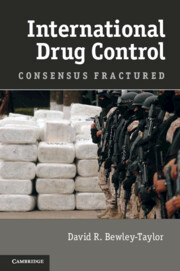Book contents
- Frontmatter
- Contents
- Figures and maps
- Tables and boxes
- Preface and acknowledgements
- Abbreviations
- 1 Introduction
- 2 Soft defection and the domestic normalization of harm reduction
- 3 Harm reduction at the UN: member state tension and systemic dissonance
- 4 Cannabis, soft defection and regime weakening
- 5 Defending the regime: the International Narcotics Control Board
- 6 Beyond regime weakening? Lessons from the UNGASS decade
- Index
- References
1 - Introduction
Published online by Cambridge University Press: 05 December 2012
- Frontmatter
- Contents
- Figures and maps
- Tables and boxes
- Preface and acknowledgements
- Abbreviations
- 1 Introduction
- 2 Soft defection and the domestic normalization of harm reduction
- 3 Harm reduction at the UN: member state tension and systemic dissonance
- 4 Cannabis, soft defection and regime weakening
- 5 Defending the regime: the International Narcotics Control Board
- 6 Beyond regime weakening? Lessons from the UNGASS decade
- Index
- References
Summary
It is my hope that when historians study the work of humankind in the field of drug control, they will write about the next few days as the time when the international community found common ground in the mission to create momentum towards a drug free world in the twenty-first century.
Statement by the United Nations (UN) Secretary-General, Mr Kofi Annan, to the opening of the Twentieth Special Session of the General Assembly, June 1998As the chairperson’s gavel came down on proceedings at the High Level ‘Political’ Segment of the fifty-second session of the Commission on Narcotic Drugs, it appeared as if it would be business as usual in Vienna, the home of the UN bodies for dealing with what has become known as the ‘world drug problem’. The High Level Segment (HLS) brought together representatives from more than 130 countries in March 2009 to conclude a year-long review of progress achieved by the international drug control system against the goals set by the UN General Assembly Special Session (UNGASS) on the World Drug Problem. At that 1998 session in New York, and under the quixotic banner ‘A Drug Free World. We Can Do It!’, member states agreed a Political Declaration committing themselves to work towards eliminating or reducing significantly the illicit production of coca, cannabis and opium, and the illicit manufacture and trafficking of psychotropic substances, as well as achieving significant and measurable results in the field of drug demand reduction by the then planned review in 2008.
After six gruelling months of inter-state negotiation, the HLS was also the venue for the announcement of a new Political Declaration and accompanying Action Plan. These soft law instruments, like their predecessors eleven years earlier, would do much to set the direction for international drug control for the next decade or so. During the general debate, a number of states pointed to the obvious fact that the UNGASS goals had not been met and lamented perceived shortcomings within the draft Declaration. Yet, the final acceptance of documents closely resembling those from the UNGASS signalled a general acceptance of the structure and ethos of the UN multilateral drug control system. While agreeing to an ‘Integrated and Balanced Strategy to Counter the World Drug Problem,’ all delegations in Vienna consequently provided formal and ongoing backing for a now well-established treaty framework; a framework anchored to the doctrine of prohibition.
- Type
- Chapter
- Information
- International Drug ControlConsensus Fractured, pp. 1 - 35Publisher: Cambridge University PressPrint publication year: 2012



